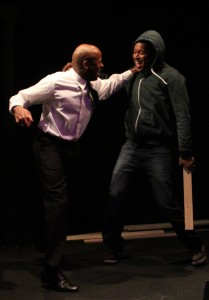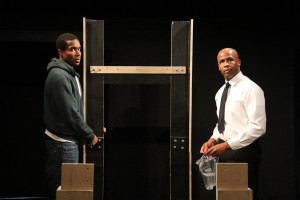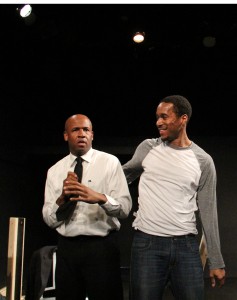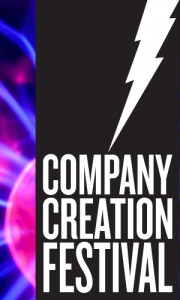UNFINISHED BUSINESS
Son of Semele’s 4th annual Company Creation Festival presents new works by nascent Los Angeles troupes. The festival’s first offering, Bunk, is what you’d expect from such a venue: a lot of youthful energy in service of a promising voice. That the play doesn’t make much sense at this point may be less important than the fact that it got put up. The Son of Semele Ensemble does young artists a great service by supporting their explorations, and at its best this kind of thing can allow audiences an interesting glimpse at a work in the throes of construction.
Such is the case with Bunk, created by the MaiM Theatre Company (writer Julie Taiwo Oni, director Nathan Singh, and actors Shon Fuller and Terrence Colby Clemons). The play begins well: a tourist-visa Nigerian (Fuller) and a U.S.-born black (Clemons) interview for the same construction job – or maybe two different positions; it’s ambiguous. The characters are nicely delineated in an early Q & A with an unseen interlocutor: the suit-and-tie African is ramrod straight, eager,  ingratiating; the droopy-jeans American sits on his spine and speaks in colloquialisms, constitutionally unwilling to approximate deference. Bunk has good, chewy language and a heart thumping to juxtapose classism, racism, and the effect of power structures on intra-racial tension. Its central motif of the soul connection between ibeji (twins) works as an effective if unsubtle thematic glue.
ingratiating; the droopy-jeans American sits on his spine and speaks in colloquialisms, constitutionally unwilling to approximate deference. Bunk has good, chewy language and a heart thumping to juxtapose classism, racism, and the effect of power structures on intra-racial tension. Its central motif of the soul connection between ibeji (twins) works as an effective if unsubtle thematic glue.
The acting is excellent. Fuller, raised in Indiana, is nearly flawless with his foreign diction (dialect coach Tuffet Schmelzle), and his emotion and beat work are as precise as his character choices. For his part Clemons bends under the weight of the chip on his character’s shoulder until I thought at times he would snap in half, and the play’s less linear moments emphasize his versatility. His chops are the most evident of the whole creative team. These actors’ moment-to-moment work is primarily responsible for extending Bunk‘s watchability about twice as long as the script alone would merit.
 When the two characters are thrust together (in a room wired for video) to build a bunk bed as a final employment test, one of the applicants predictably kowtows to the boss’s frequent interruptions and remarks, while the other of course takes offense and infers a racial bias on the part of management (a bias incidentally supported by the text). It follows that one accuses the other of Tom-ism, and the accuser gets called a lazy bum. The play’s biggest trope, a groaner at this late date in playwriting history: in the face of divide-and-conquer antagonism from The Man, a convenient injury forces the applicants to cooperate and find common ground. Backstory and action serve to flesh out these archetypes but not to heighten drama, of which the play has precious little after the first twenty minutes, as the tale of human relations degenerates into an uninspired call for the abolition of stereotypes. But, no matter how well-acted, as of now these characters are stereotypes.
When the two characters are thrust together (in a room wired for video) to build a bunk bed as a final employment test, one of the applicants predictably kowtows to the boss’s frequent interruptions and remarks, while the other of course takes offense and infers a racial bias on the part of management (a bias incidentally supported by the text). It follows that one accuses the other of Tom-ism, and the accuser gets called a lazy bum. The play’s biggest trope, a groaner at this late date in playwriting history: in the face of divide-and-conquer antagonism from The Man, a convenient injury forces the applicants to cooperate and find common ground. Backstory and action serve to flesh out these archetypes but not to heighten drama, of which the play has precious little after the first twenty minutes, as the tale of human relations degenerates into an uninspired call for the abolition of stereotypes. But, no matter how well-acted, as of now these characters are stereotypes.
 One real surprise abandons the production’s nuts-and-bolts realism and spins it into another stylistic universe, one still governed by on-the-nose metaphor but off the scale of believable proportion. Throughout, the interviewer gives instructions increasingly reminiscent of either a psychology study or a torture session. The violent climax screams its political theme at the expense of logic via an inexplicable event. It’s an oddly unmotivated, allegorical choice, especially in a concrete presentation whose primary physical element is the center-stage assembly of real hardware. There’s an inherent interest in watching a thing being built. But the director allows a purported woodworker to hit threaded bolts with a hammer, and to use needle-nose pliers to tighten nuts when a ratchet set and a wrench have already made appearances; similarly, the writer introduces the issue of incompatible lengths of lumber when we already know there’s a saw on the premises. The problem of the slats is dropped without resolution, and the bunk itself is never finished, but sort of shoved upstage out of the way. There’s a Chekhov’s Gun lesson here; MaiM’s Bed, maybe? Anyway, it’s a show with big concepts, the details of which have not been fine-tooled. I look forward to a redesign.
One real surprise abandons the production’s nuts-and-bolts realism and spins it into another stylistic universe, one still governed by on-the-nose metaphor but off the scale of believable proportion. Throughout, the interviewer gives instructions increasingly reminiscent of either a psychology study or a torture session. The violent climax screams its political theme at the expense of logic via an inexplicable event. It’s an oddly unmotivated, allegorical choice, especially in a concrete presentation whose primary physical element is the center-stage assembly of real hardware. There’s an inherent interest in watching a thing being built. But the director allows a purported woodworker to hit threaded bolts with a hammer, and to use needle-nose pliers to tighten nuts when a ratchet set and a wrench have already made appearances; similarly, the writer introduces the issue of incompatible lengths of lumber when we already know there’s a saw on the premises. The problem of the slats is dropped without resolution, and the bunk itself is never finished, but sort of shoved upstage out of the way. There’s a Chekhov’s Gun lesson here; MaiM’s Bed, maybe? Anyway, it’s a show with big concepts, the details of which have not been fine-tooled. I look forward to a redesign.
The most encouraging part of my evening happened when Nathan Singh thanked the audience for coming to see “our experiment.” Process is becoming a lost component of art in the age of first-draft publishing, and it’s good to hear a young artist acknowledge that “work-in-progress” means “it’s not done yet” rather than “it’s perfect in all its incarnations.”
Bunk
MaiM Theatre Company
part of Son of Semele Ensemble’s
Company Creation Festival
Son of Semele Theater
3301 Beverly Blvd. in Silverlake
scheduled to end February 23, 2014
for tickets, visit www.sonofsemele.org


